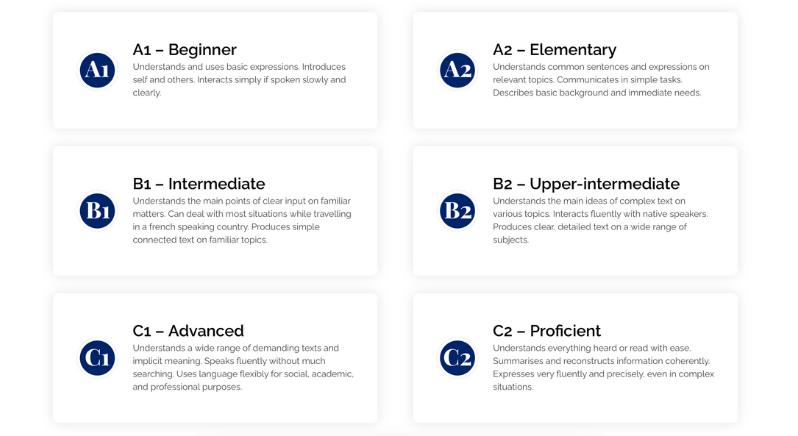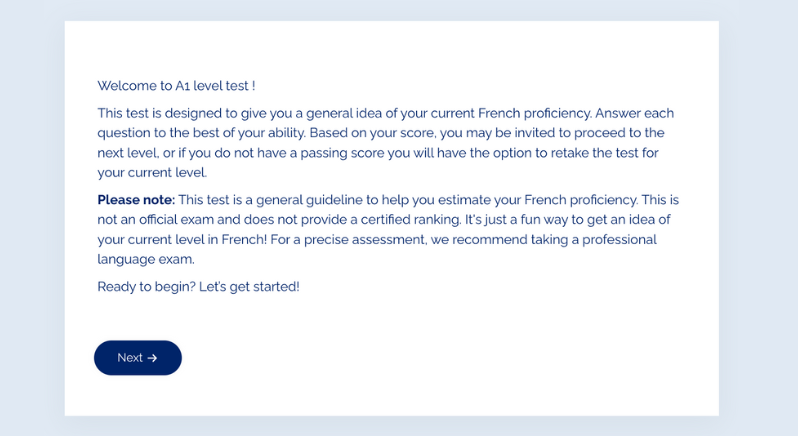Starting your French learning journey can be exciting, but knowing where you stand is key to progressing efficiently. This is why it is important to understand how to assess your French level.
This guide will help you understand how to do so and set you on the right path.
Framework
When it comes to assessing language skills, the Common European Framework of Reference for Languages (CEFR) is the international standard that most language learners and institutions use.
It divides proficiency into 6 levels, ranging from absolute beginners to fluent speakers:
- A1 (Beginner): You can understand and use simple expressions and introduce yourself.
- A2 (Elementary): You can communicate in basic situations and understand common phrases.
- B1 (Intermediate): You can handle most everyday situations and can express yourself on familiar topics.
- B2 (Upper intermediate): You can interact fluently and express detailed ideas clearly.
- C1 (Advanced): You can speak and write fluently in most situations without much effort.
- C2 (Proficient): You have near-native language proficiency, capable of understanding virtually everything.
Assessing your French level involves determining where you fall on this spectrum based on your language skills.
How are language skills assessed
When assessing your French level, you should consider 4 key skills: speaking, writing, reading, and listening.
Let’s break down each skill and what you’re looking at for each level:
Speaking
- A1/A2: You can exchange simple information in everyday situations but struggle to speak fluently in more complex contexts.
- B1/B2: You can converse confidently on a range of familiar topics and can manage spontaneous interactions with a reasonable level of fluency.
- C1/C2: You speak fluently and accurately, using complex sentences and idiomatic expressions with ease, often without hesitation.
Writing
- A1/A2: Your writing consists of short and simple sentences with basic vocabulary.
- B1/B2: You can write organized texts on a variety of topics with more complex structures and vocabulary.
- C1/C2: You can write detailed, clear, and well-structured texts, such as essays or reports, demonstrating a high command of the language.
Reading
- A1/A2: You can read simple texts, such as menus, signs, and short articles, but struggle with more advanced content.
- B1/B2: You can understand the main points of most texts on familiar topics, including news articles and short stories.
- C1/C2: You can read complex texts, including literary works, academic papers, and reports, with ease.
Listening
- A1/A2: You can understand basic phrases and common expressions but will struggle with natural-speed conversations.
- B1/B2: You can understand the main points of conversations, even if they include some unfamiliar vocabulary.
- C1/C2: You understand virtually everything you hear, even in rapid or complex discussions.

Now that you understand the components of language assessment, let’s explore two effective ways to evaluate your French proficiency.
Self-assessment
A great first step to assessing your French proficiency is to take an online language test. We have designed our own online level test to give you a quick and accurate way to assess your current French level. Whether you’re considering a language course abroad or just want to measure your progress, this is a great starting point.
Curious about your current French proficiency? Take our free online here!

Professional assessment
For a more accurate assessment, we recommend taking a placement test with a language school.
These tests assess your strengths and weaknesses across various linguistic areas, ensuring that you are placed in a class that matches your skill level.
For more details, check out our article: https://gogofrance.com/en/blog/french-placement-test-guide/
Learn French in France
Learning French through full immersion is the fastest way to progress. At Go! Go! France, we help international students like you with everything—from choosing the right school to preparing for life in France. Whether you’re looking for a short-term course or a long-term program, we’re here to guide you every step of the way.
Contact us today to start your study adventure in France!










